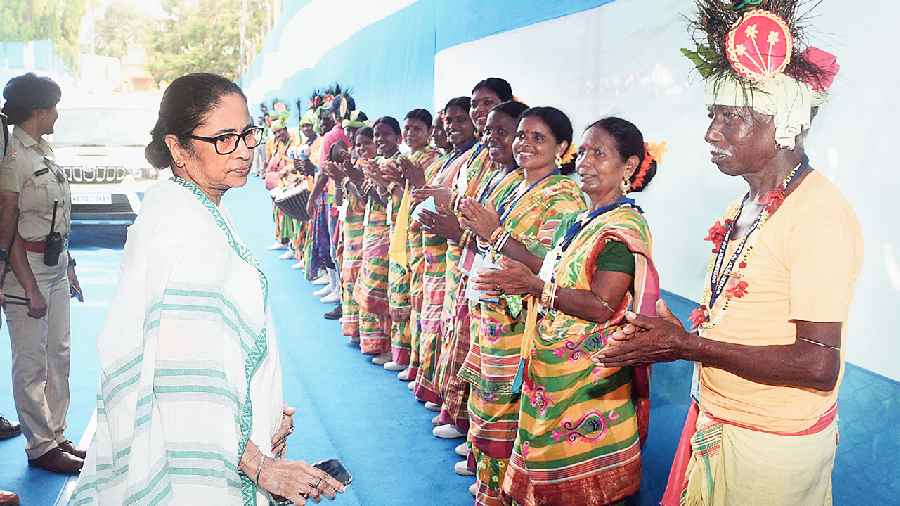The problems in the paddy procurement system in Bengal tumbled out in the open at an administrative review meeting chaired by the chief minister in Bankura on Tuesday when she took up farmers’ complaint that they could not sell their produce to the government at minimum support price.
“A 75-year-old farmer of Chhatna (in Bankura district) went to the procurement centre to sell 30 quintals of paddy. But he couldn’t and he was forced to sell the crop to a local trader (aratdar) at a cheaper price. Why couldn’t he sell his produce?” asked Mamata Banerjee during the Bankura district review meeting, quoting a letter sent to the chief minister’s office .
Pradip Majumdar, chief minister’s agriculture advisor who was present at the meeting, tried to explain that farmers needed to register at procurement centres set up at Kisan Mandis first before visiting them with their produce on a specific day.
Mamata wasn’t, however, satisfied with the answer. Then, she rolled out a few suggestions — like maintaining log books of farmers who come to sell their produce but cannot and then ensuring that their crop is procured at a later date — to smoothen the process.
Even as officials agreed to the chief minister’s suggestions and promised to act accordingly, several experts have told this correspondent that the real problem lies somewhere else.
“There are 468 procurement centres in the state where farmers are supposed to carry their produce to get the benefit of MSP.… Since there are
not enough procurement centres, the farmers are allotted a later date to sell the produce. Of 72 lakh farmers in the state, most are small growers who cannot hold their stock for months waiting for the scheduled date. In distress, they are forced to sell the crop to local traders at a much cheaper rate,” said a retired bureaucrat.
The MSP for a quintal of paddy is Rs 1,940 whereas local traders buy the produce at prices ranging from Rs 1,150 to Rs 1,200.
The chief minister has reasons to be unhappy with the system as the government plays an important role in the paddy procurement in rural Bengal where 72 per cent population is dependent on agriculture and paddy remains the predominant crop.
“If farmers are not happy, the Trinamul Congress cannot be in a comfortable position ahead of next year’s panchayat polls. In the 2021 Assembly polls, Trinamul had swept agriculturally rich districts like Hooghly and East Burdwan only because of its policies that saved farmers from a possible loss even after surplus production of potato. Now, if farmers don’t get the MSP for paddy, it is going to be a problem for the ruling party,” said a source.
Senior administrative officials said though the government had somehow achieved its target of procuring 49 lakh tons of paddy at the end of the season last year, there were questions whether small and marginal farmers, who made up 90 per cent of total 72 lakh farmers in the state, got the benefit of the procurement system.
Several bureaucrats who worked as district magistrates said the MSP eluded the small farmers.
“If you want to sell your produce to the government, you have to wait for a few months because of lack of procurement centres. The small farmers cannot often hold their produce for long as they need money to run their families and pay back lenders,” explained an officer.
“So, ideally, the government has to reach them on their doorsteps soon after harvesting,” he added. “Involving self-help groups and co-operative societies in the procurement system can address the problem to some extent.”
An agriculture expert said while the Trinamul Congress government should be complemented for raising the procurement target to nearly 50 lakh tons from 15 lakh tons during the Left Front tenure, it had to put in place a system to reach the farmers at the earliest soon after the harvesting.











